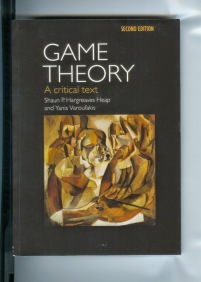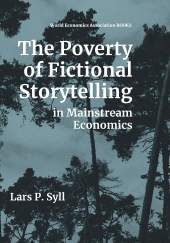From Lars Syll Back in 1991, when yours truly earned his first PhD with a dissertation on decision making and rationality in social choice theory and game theory, I concluded that “repeatedly it seems as though mathematical tractability and elegance — rather than realism and relevance — have been the most applied guidelines for the behavioural assumptions being made. On a political and social level, it is doubtful if the methodological individualism, ahistoricity and formalism they are advocating are especially valid.” This, of course, was like swearing in church. My mainstream colleagues were — to say the least — not exactly überjoyed. For those of you who are not familiar with game theory, but are eager to learn something relevant about it, I have three suggestions: Start with the
Topics:
Lars Pålsson Syll considers the following as important: Uncategorized
This could be interesting, too:
tom writes The Ukraine war and Europe’s deepening march of folly
Stavros Mavroudeas writes CfP of Marxist Macroeconomic Modelling workgroup – 18th WAPE Forum, Istanbul August 6-8, 2025
Lars Pålsson Syll writes The pretence-of-knowledge syndrome
Dean Baker writes Crypto and Donald Trump’s strategic baseball card reserve
from Lars Syll
Back in 1991, when yours truly earned his first PhD with a dissertation on decision making and rationality in social choice theory and game theory, I concluded that “repeatedly it seems as though mathematical tractability and elegance — rather than realism and relevance — have been the most applied guidelines for the behavioural assumptions being made. On a political and social level, it is doubtful if the methodological individualism, ahistoricity and formalism they are advocating are especially valid.”
This, of course, was like swearing in church. My mainstream colleagues were — to say the least — not exactly überjoyed.
For those of you who are not familiar with game theory, but are eager to learn something relevant about it, I have three suggestions:
Start with the best introduction there is

then go on to read more on the objections that can be raised against game theory and its underlying assumptions, e.g. rationality, ‘backward induction’ and ‘common knowledge’ in

and then finish off with listening to what one of the world’s most renowned game theorists — Ariel Rubinstein — has to say on the — rather limited — applicability of game theory in this interview (emphasis added):
What are the applications of game theory for real life?
That’s a central question: Is game theory useful in a concrete sense or not? Game theory is an area of economics that has enjoyed fantastic public relations. [John] Von Neumann [one of the founders of game theory] was not only a genius in mathematics, he was also a genius in public relations. The choice of the name “theory of games” was brilliant as a marketing device.
The word “game” has friendly, enjoyable associations. It gives a good feeling to people. It reminds us of our childhood, of chess and checkers, of children’s games. The associations are very light, not heavy, even though you may be trying to deal with issues like nuclear deterrence. I think it’s a very tempting idea for people, that they can take something simple and apply it to situations that are very complicated, like the economic crisis or nuclear deterrence. But this is an illusion. Now my views, I have to say, are extreme compared to many of my colleagues. I believe that game theory is very interesting. I’ve spent a lot of my life thinking about it, but I don’t respect the claims that it has direct applications.
The analogy I sometimes give is from logic. Logic is a very interesting field in philosophy, or in mathematics. But I don’t think anybody has the illusion that logic helps people to be better performers in life. A good judge does not need to know logic. It may turn out to be useful – logic was useful in the development of the computer sciences, for example – but it’s not directly practical in the sense of helping you figure out how best to behave tomorrow, say in a debate with friends, or when analysing data that you get as a judge or a citizen or as a scientist …
In general, I would say there were too many claims made by game theoreticians about its relevance. Every book of game theory starts with “Game theory is very relevant to everything that you can imagine, and probably many things that you can’t imagine.” In my opinion that’s just a marketing device.
Why do it then?
What I’m opposing is the approach that says, in a practical situation, “OK, there are some very clever game theoreticians in the world, let’s ask them what to do.” I have not seen, in all my life, a single example where a game theorist could give advice, based on the theory, which was more useful than that of the layman …
Looking at the flipside, was there ever a situation in which you were pleasantly surprised at what game theory was able to deliver?
None. Not only none, but my point would be that categorically game theory cannot do it.
Most mainstream economists — still — think that game theory is useful and can be applied to real life and give important and interesting results. That, however, is a rather unsubstantiated view. What game theory does is, strictly seen, nothing more than investigating the logic of behaviour among non-existent robot-imitations of humans. Knowing how those ‘rational fools’ play games does not help us decide and act when interacting with real people. Knowing some game theory may actually make us behave in a way that hurts both ourselves and others. Decision-making and social interaction are always embedded in socio-cultural contexts. Not taking account of that, game theory will remain an analytical cul-de-sac that never will be able to come up with useful and relevant explanations.
Over-emphasizing the reach of instrumental rationality and abstracting away from the influence of many known to be important factors, reduces the analysis to a pure thought experiment without any substantial connection to reality. Limiting theoretical economic analysis in this way — not incorporating both motivational and institutional factors when trying to explain human behaviour — makes economics insensitive to social facts.

Game theorists extensively exploit ‘rational choice’ assumptions in their explanations. That is probably also the reason why game theory has not been able to accommodate well-known anomalies in its theoretical framework. That should hardly come as a surprise to anyone. Game theory with its axiomatic view of individuals’ tastes, beliefs, and preferences, cannot accommodate very much of real-life behaviour. It is hard to find really compelling arguments in favour of us continuing down its barren paths since individuals obviously do not comply with, or are guided by game theory.
Apart from a few notable exceptions, it is difficult to find really successful applications of game theory. Why? To a large extent simply because the boundary conditions of game theoretical models are false and baseless from a real-world perspective. And, perhaps even more importantly, since they are not even close to being good approximations of real life, game theory lacks predictive power. This should come as no surprise. As long as game theory sticks to its ‘rational choice’ foundations, there is not much to be hoped for.
Game theorists can, of course, marginally modify their toolbox and fiddle with the auxiliary assumptions to get whatever outcome they want. But as long as the ‘rational choice’ core assumptions are left intact, it seems a pointless effort to hamper an already excessive deductive-axiomatic formalism. If you do believe in the real-world relevance of game theoretical ‘science fiction’ assumptions such as expected utility, ‘common knowledge,’ ‘backward induction,’ correct and consistent beliefs etc., etc., then adding things like ‘framing,’ ‘cognitive bias,’ and different kinds of heuristics, do not ‘solve’ any problem. If we want to construct a theory that can provide us with explanations of individual cognition, decisions, and social interaction, we have to look for something else.
Applications of game theory have on the whole resulted in massive predictive failures. People simply do not act according to the theory. They do not know or possess the assumed probabilities, utilities, beliefs or information to calculate the different (‘subgame,’ ‘trembling-hand perfect’) Nash equilibria. They may be reasonable and make use of their given cognitive faculties as well as they can, but they are obviously not those perfect and costless hyper-rational expected utility maximizing calculators game theory posits. And fortunately so. Being ‘reasonable’ makes them avoid all those made-up ‘rationality’ traps that game theory would have put them in if they had tried to act as consistent players in a game theoretical sense.
